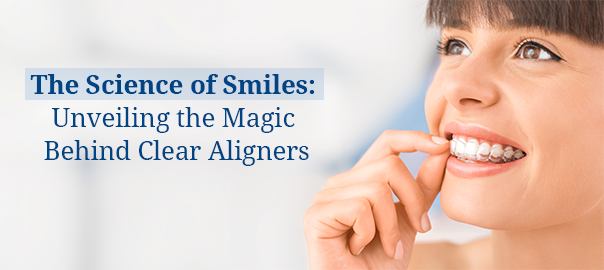
The Science of Smiles: Unveiling the Magic Behind Clear Aligners
Clear aligners have revolutionized orthodontic treatment, offering a discreet and effective alternative to traditional braces. This article delves into the mechanics of teeth aligners and explores the reasons behind the growing popularity of these aligners for teeth.
The Mechanics of Aligner Movement
Aligner therapy operates on a fundamental principle of orthodontics: consistent pressure induces tooth movement. Here’s how teeth aligners work:
- Each clear aligner is custom-fabricated using BPA-free plastic, molded over a 3D-printed model of the patient’s projected tooth position.
- Aligners create incremental shifts, typically moving teeth about 0.2mm per stage.
- The process mimics animation principles, with each aligner representing a “frame” in the overall teeth straightening sequence.
The Three Phases of Aligner Treatment
- Expansion: This initial phase focuses on creating space by widening the dental arch, allowing teeth to align without obstruction.
- Alignment: Individual teeth are gradually shifted into their desired positions within the newly expanded arch using clear aligners.
- Fine-tuning: The final phase involves minute adjustments to perfect the smile’s appearance.
Technological Advancements Driving Popularity
Several factors contribute to the increasing preference for teeth aligners:
- Teledentistry: Remote consultations and monitoring have made teeth straightening treatment more accessible.
- 3D Printing: High-precision models enable accurate treatment planning and aligner fabrication.
- Materials Science: Advanced plastics offer improved clarity, durability, and performance for aligners for teeth.
The Comfort Factor
Teeth aligner therapy employs a unique A&B system:
- A aligners: More flexible, initiating tooth movement.
- B aligners: Slightly firmer, stabilizing teeth in their new positions.
This approach ensures gradual, controlled movement, minimizing discomfort and reducing the risk of complications associated with sudden shifts.
Retention: Securing the Results
Post-treatment retention is crucial for maintaining results. Modern retention protocols for clear aligners typically involve:
- Initial full-time wear (22 hours/day) for two months
- Nightly wear for up to a year
- Periodic wear several times a week thereafter
Summary
Tooth Aligners therapy represents a convergence of orthodontic principles and cutting-edge technology. Its effectiveness, comfort, and discretion have positioned teeth aligners as a preferred option for patients seeking orthodontic treatment in the modern era.
Leave a Reply
Leave a Reply
Explore More Similar Posts
Explore More Blogs


Leave a Reply